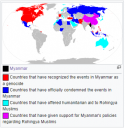Well, its true that China agreed to cede Chinese border areas/states to Myanmar(something the ROC funny enough still claims for China) to have friendly ties with Mynamar today. I wonder why the same is not done with India? Might as well recognise the current border as defacto border and leave it at that. Think will serve both countries.No need to talk about it. China already made the decision to resolve the disputed border with Myanmar. Now China enjoys a friendly neighbour, which free China to focus on places actually matter, like Taiwan.
You are using an out of date browser. It may not display this or other websites correctly.
You should upgrade or use an alternative browser.
You should upgrade or use an alternative browser.
Myanmar/Burma civil conflict
- Thread starter flyzies
- Start date
China was ready to cede zangnan claim if India cede claim on aksai chin held by China. Weirdly enough China is not offering the same today, I wonder what changed.Well, its true that China agreed to cede Chinese border areas/states to Myanmar(something the ROC funny enough still claims for China) to have friendly ties with Mynamar today. I wonder why the same is not done with India? Might as well recognise the current border as defacto border and leave it at that. Think will serve both countries.
Patience has it's limits. (Hence Ma Bha Tha)China was ready to cede zangnan claim if India cede claim on aksai chin held by China. Weirdly enough China is not offering the same today, I wonder what changed.
Classic example of Indian bad faith mindset in negotiations. Why can't you let me win, regardless of weather you win or lose.Well, its true that China agreed to cede Chinese border areas/states to Myanmar(something the ROC funny enough still claims for China) to have friendly ties with Mynamar today. I wonder why the same is not done with India? Might as well recognise the current border as defacto border and leave it at that. Think will serve both countries.
I wonder why out of 14 countries China only has land border disputes with India and India's vassal Bhutan, while India has border disputes with 3/4 of its land neighbours.
The difference of India from all other Chinese neighbours is that India based its claim on southern Tibet on the "treaty" between British Raj and Tibaten government without Qing dynasty's involvment and consent. China reject that "treaty" being valid at all.Well, its true that China agreed to cede Chinese border areas/states to Myanmar(something the ROC funny enough still claims for China) to have friendly ties with Mynamar today. I wonder why the same is not done with India? Might as well recognise the current border as defacto border and leave it at that. Think will serve both countries.
According to treaty between Qing and Britain, Tibet does not have authority over matters with foreign states. Therefor, Qing rejected the legality of the border agreement. From China's perspective, the border with India is never settled. This means that China can trade land with India including ceding southern Tibet on the condition that India acknowledge the invalidity of the "treaty" between British Raj and Tibetan local government.
However, India assumes to be the successor state to British Raj instead of being part of British Raj that break free. As a succesor state India must insist on the validity of that "treaty" which China won't accept. If India accept China's position, the treaty is invalidy, it also have to give up a lot of claims to Bangladish and Myanmar whose lands were taken away and put into India during the British rule.
The deadlock essentially boiled down to the question of "What is India" from a legal perspective. China sees Republic of India as new creation by the British partition, not a successor state of British empire, therefor India's border with China is the business between China and Britain therefor never legally settled. After British departure, anything that was not agreed between China and Britain is open issue.
All other Chinese neighbours have various treaties that were signed between Qing dynasty or ROC regardless gains or loss, fair or not. The issues were only about exactly how the line on the ground is measured and marked. There is no dispute of the treaties themselves.
That is a lie that is created by ROC. The border treaty of Myanmar and China were agreed by Qing dynasty and Britian before ROC, let alone PRC.Well, its true that China agreed to cede Chinese border areas/states to Myanmar(something the ROC funny enough still claims for China) to have friendly ties with Mynamar today. I wonder why the same is not done with India? Might as well recognise the current border as defacto border and leave it at that. Think will serve both countries.
ROC behaves like a bad looser, it never had the chance and power to realize its "patriotic" claims but only to blaim PRC for ROC's own impotence. ROC is so rubbish that it even "reclaimed" Mongolia after itself allowed Mongolia's independence referendum to happen. To this day there are still so many ROC fans bragging about Mongolia being included in ROC map. What a mental masturbation.
I bet those same ROC fans would support tibetan independence.That is a lie that is created by ROC. The border treaty of Myanmar and China were agreed by Qing dynasty and Britian before ROC, let alone PRC.
ROC behaves like a bad looser, it never had the chance and power to realize its "patriotic" claims but only to blaim PRC for ROC's own impotence. ROC is so rubbish that it even "reclaimed" Mongolia after itself allowed Mongolia's independence referendum to happen. To this day there are still so many ROC fans bragging about Mongolia being included in ROC map. What a mental masturbation.





